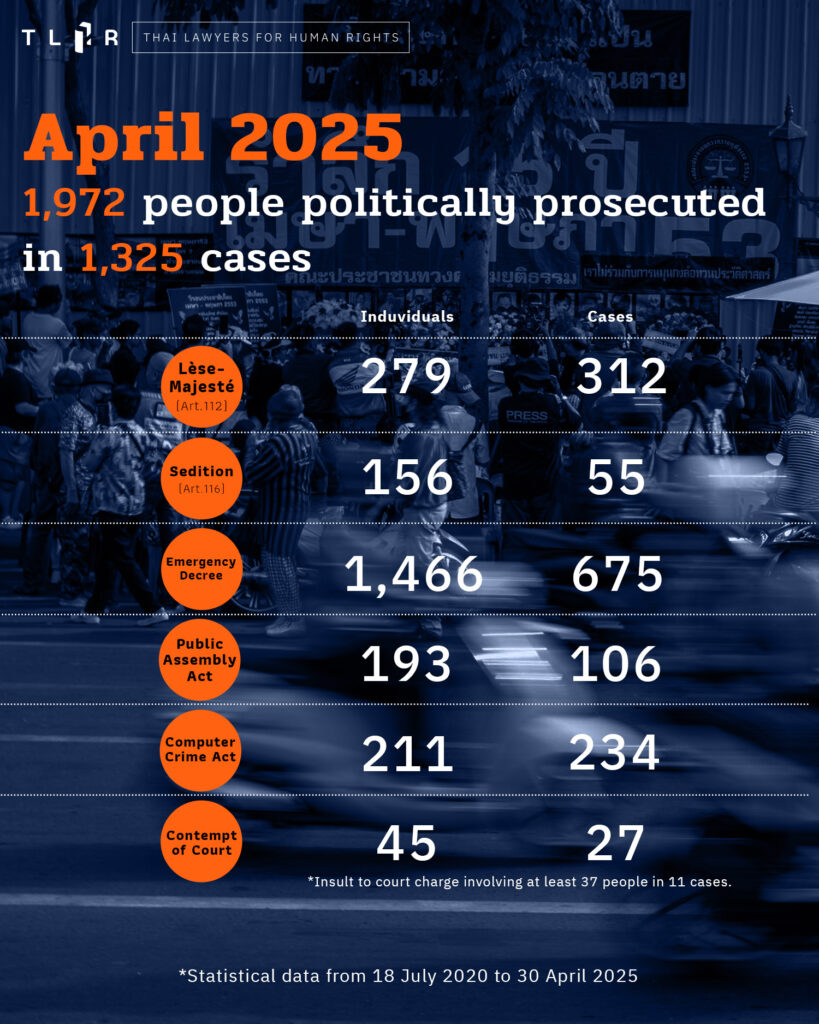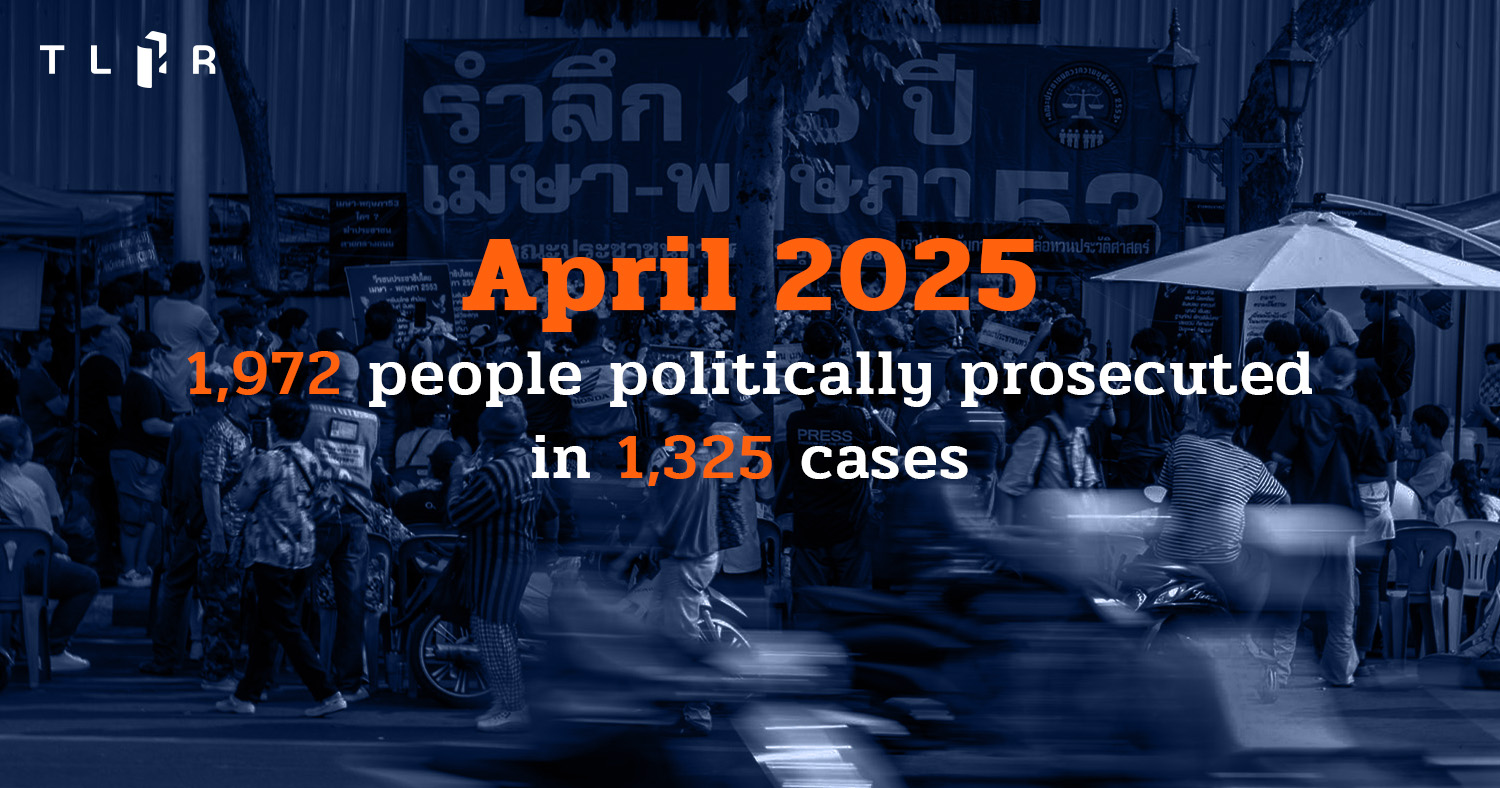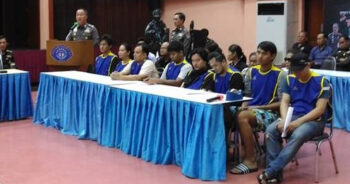April 2025 saw seven new cases concerning political expression, one of which was the case against Dr. Paul Chambers under Section 112 (lèse-majesté) of the Thai Criminal Code in connection with a promotional blurb introducing an academic seminar hosted by the ISEAS–Yusof Ishak Institute. The case was brought against him by an officer authorized by the Third Army Area Commander.
Additionally, cases under the Public Assembly Act were filed against P-Move, former workers of Yarnapund PCL, the Northern Peasant Federation (NPF), and the Assembly of People Living in the Forests. These groups had gathered in front of Government House to raise awareness about their respective issues. They have since received retrospective summonses to hear charges related to their assemblies held between 2024 and 2025.
Last month, verdicts were delivered in at least two Section 112 cases. In the case of “Trun,” the Court of Appeal upheld the lower court’s decision, sentencing him to one year and six months in prison without suspension. He was not granted bail pending the Supreme Court’s review. In another case involving ‘Pimchanok,’ the Court of Appeal Region 5 also upheld the previous prison sentence of two years without suspension, although she was granted bail while awaiting the Supreme Court’s hearing.
Additionally, a ruling was issued in the “Reclaiming Chiang Mai University Art Center” case, which stemmed from a 2021 incident where faculty members and students broke chains to access the Chiang Mai University Art Center in order to hold their annual art exhibition, as part of their academic curriculum. The court dismissed the case, stating that the Art Center’s board had been unreasonably slow in approving the request to use the venue, and that the defendants had acted on reasonable grounds. There were also rulings in at least six other cases related to political expression and public assemblies.
Most notably, over the past month, the Criminal Court has begun issuing formal orders in individual case dockets—particularly in Section 112 cases and those involving political expression that have drawn public attention—prohibiting anyone from reporting or disseminating details of courtroom proceedings or any events within the Criminal Court without prior authorization.
These publication bans have been issued in at least four cases, with the wording of the orders being identical in every instance, despite being issued by different judicial panels. This pattern suggests that the orders may not reflect the individual discretion of each judge, but rather stem from a broader administrative directive. Such a practice raises concerns about potential conflicts with the principle of judicial independence, as well as the right to a fair trial—one that is conducted openly, transparently, and subject to public scrutiny.
.
In addition, the court has refused to issue subpoenas for both documentary and witness evidence in the Section 112 case against ‘Benja,’ stemming from her speech at the #ExposingSiamBioscience rally in 2021, despite the defense having submitted four separate requests for the court to do so.
Meanwhile, last month the Attorney General decided not to indict nine activists and members of the public on charges of violating the Emergency Decree and five other related offenses. The charges were tied to the #ReclaimingThailandTopplingParasite protest, which was held to commemorate the first anniversary of the Free Youth movement’s 18 July 2021 demonstration. The case had been stalled at the police investigation stage for more than three years.
.
According to the Thai Lawyers for Human Rights’ documentation, since the “Free Youth” assembly on 18 July 2020 through 30 April 2025, at least 1,972 individuals have been charged for participating in public assemblies or expressing their political opinions in 1,325 cases. Compared with March 2025 , there have been 7 additional cases.
Altogether, there have been at least 4,046 legal actions against the individuals although some of them are charged for multiple offences.
Prosecution statistics in key offences;
1. Section 112 (lèse-majesté) of the Criminal Code, at least 279 individuals in 312 cases (Of this, at least 165 cases have stemmed from reports to the police made by members of the public.)
2. Section 116 (sedition) of the Criminal Code, at least 156 individuals in 55 cases
3. Violation of the Emergency Decree, at least 1,466 individuals in 675 cases
4. Violation of the Public Assembly Act, at least 193 individuals in 106 cases
5. Violation of the Computer Crime Act, at least 211 individuals in 234 cases
6. Contempt of court, at least 45 individuals in 27 cases, and insult of the court, at least 37 individuals in 11 cases
Of 1,325 cases, 699 cases have reached their final verdicts (although some cases remain outstanding, since certain defendants decided to appeal the verdicts, while others have not).

.
Prosecution trend in April 2025 and key events;
Arrest Warrant Issued for American Academic Paul Chambers Following Section 112 Charges by Third Army Region; Protesters at Government House Receive Retroactive Public Assembly Act Summonses from 2024
Last month, a new Section 112 case emerged involving Dr. Paul Chambers, an American academic affiliated with the Institute of Southeast Asian Studies, Faculty of Social Sciences, Naresuan University. The Phitsanulok Provincial Court issued an arrest warrant against him for alleged violations of Section 112 and the Computer Crime Act, related to the publication of a promotional blurb for an academic webinar hosted by the ISEAS–Yusof Ishak Institute, a Singapore-based research institute. This case was filed following authorization from the Third Army Commander.
After the charges were filed, Dr. Chambers was detained, with the Phitsanulok Provincial Court initially denying bail during the investigation. However, after an appeal, the Court of Appeal Region 6 granted him bail under the condition that he wear an electronic monitoring device.
Subsequently, Dr. Chambers received an order from the Immigration Police revoking his visa to stay in Thailand, citing “alleged wrongdoing” under Section 112. He is currently appealing this revocation.
On 1 May 2025, the Office of the Attorney General issued a press release announcing that the Regional Chief Public Prosecutor of Region 6 had decided not to indict Dr. Chambers. The office stated it would apply to the Phitsanulok Provincial Court for his release and send the non-prosecution order to the Commander of Police Region 6 for any objections.
Meanwhile, pending the appeal of the visa revocation, the Naresuan University informed Dr. Chambers that his employment was terminated, citing his revoked visa status as grounds for being ineligible to work in Thailand.
This case highlights the problems faced by individuals accused under Section 112. For foreign nationals, the legal challenges are compounded by administrative actions like visa revocation, which can upend their entire lives—disrupting not only their freedom but also their ability to work and live in Thailand, regardless of their eventual innocence. Beyond the personal toll, Dr. Chamber’s case also risks straining diplomatic relations between the United States and Thailand, underscoring how these legal actions can have significant international repercussions.
.
Last month, civil society groups including P-Move, former workers of Yarnapund PCL, the Northern Peasant Federation (NPF), and the Assembly of People Living in the Forests—who gathered to demand solutions to their issues in front of the Government House—began receiving retrospective summonses to answer charges related to their protests in 2024-2025. They face five cases under the Public Assembly Act.
The first case concerns a demonstration on 1 April 2025, where members of the Northern Peasant Federation (NPF) and the Assembly of People Living in the Forests assembled in front of the Government House to monitor a cabinet meeting on resolving forest and land issues. Pol Lt Col Suraphan Boonpeam reported the case, and seven individuals have been summoned to answer charges under the Public Assembly Act.
Another case relates to the #PmoveReclaimingRights demonstration on 8 October 2024 near the Government House. Pol Lt Col Chaithawat Chiangtha reported the case, resulting in five individuals being summoned on charges under the Public Assembly Act.
There were two further demonstrations under #PmoveReclaimingRights near the Government House on 16 and 18 October 2024. Pol Lt Col Chaithawat Chiangtha reported both cases, and Mr. Jamnon Noophan has been summoned to answer charges in both cases.
Lastly, former workers of Yarnapund PCL gathered in front of the Government House to demand severance pay after being laid off without compensation. Pol Lt Col Suraphan Boonpeam reported this case, though it is unclear how many individuals have been summoned to answer charges.
A summary of verdicts on Section 112 cases
April 2025
| Court | Case | Verdict |
| Court of Appeal Section 112 | “Tran”, 25-year-old-person from Bangkok For commenting in the livestreaming of the People’s Center for the Protection of Monarchy (SPPS) Facebook page | Verdict upheld and sentenced toone-year-and-six-month-in prisonWithout suspensionDenied bail |
| Court of Appeal Section 112 | Pimchanok Jirathaiyanon, 27-year-old-political-activist For posting Facebook message: ‘Government sucks, institution sucks, too’ on 17 February 2022 | Verdict upheld and sentenced totwo-year-imprisonmentWithout suspensionGranted bail |
Court Convicts Defendants in Two Section 112 Cases with Unsuspended Sentences — One Defendant Imprisoned Before Granted Bail, Another Denied Bail
Throughout April 2025, courts issued rulings in at least two Section 112 cases, both at the Court of Appeal level. In each case, the Appeals courts upheld previous verdicts finding the defendants guilty and sentenced them to imprisonment without suspension. One defendant was granted bail, while the other was denied bail. Details are as follows:
In the case against “Trun” (pseudonym), the 25-year-old from Bangkok was indicted for posting a comment during a livestream on the Facebook page of the People’s Center for the Protection of Monarchy (SPPS) on 5 December 2021. The Court of Appeal upheld the previous verdict, sentencing him to 1 year and 6 months in prison without suspension. After the Supreme Court denied his bail request, he became the latest political prisoner to be detained at Bangkok Remand Prison.
In the case against Pimchanok Jirathaiyanon (Chaihong), a 27-year-old activist, she was accused of posting a Facebook message stating “Government sucks, institution sucks too 🔥🙂” on 17 February 2022. The Court of Appeal Region 5 upheld the original verdict, sentencing her to 2 years in prison without suspension, leading to her immediate imprisonment. She was granted bail by the Supreme Court after being held in custody for four days (28 April – 1 May 2025).
As of 6 May 2025, at least 47 individuals remain in prison for exercising their right to political expression or for politically motivated charges. Among them, at least 29 have been denied bail, including 19 who are charged under Section 112.
Regarding bail applications for detainees pending trial and appeal, last month lawyers submitted bail requests or appealed bail denials for at least three individuals: Dr. Paul Chambers, “Daeng Shingjang,” and Arnon Nampa. The Court of Appeal Region 6 granted bail only to Dr. Chambers, while the other requests were dismissed.
.
Court Acquits Defendants in CMU Art Gallery Reclamation Case, Citing Delays by Gallery Committee — Defendants’ Actions Deemed Justifiable
In the “Reclaiming Chiang Mai University Art Center” case, Thasnai Sethaseree, Sorayut Aiemueayut, and Yotsunthon Ruttapradid were charged with mischief and trespassing after faculty and students cut chains and entered the Chiang Mai University Art Center on 16 October 2021 to hold their annual art exhibition as part of an academic course.
The Chiang Mai Provincial Court dismissed the case, ruling that the Art Center’s Board had unreasonably delayed the decision on the defendants’ request to use the space for the exhibition, which was part of students’ research projects. The court found their actions to be a legitimate effort to reclaim the right to organize the exhibition. Furthermore, during the exhibition, the plaintiff neither stopped nor expelled the defendants, and later formally recognized the academic results related to the exhibition. Therefore, the court concluded that the defendants’ actions were justified.
Last month, verdicts were issued in at least six additional cases related to political assemblies and expressions, with most resulting in convictions.
In the case against “Jackie,” accused of possessing explosives and violating the Emergency Decree, he was arrested in front of Din Daeng Flats during police efforts to disperse the #Mob6Oct21 protest. Police claimed to have found homemade bombs (ping pong bombs) on his person.
The Court of Appeal overturned the conviction, citing inconsistencies between eyewitness testimony and official reports about where the evidence was found. Moreover, forensic analysis showed that the fingerprints and DNA on the alleged explosives did not match Jackie’s. Given reasonable doubt, the court ruled it was not proven that Jackie possessed the explosives.
.
Meanwhile, in the case against Ekkachai Hongkangwan for violating the Advertisement by Using Sound Amplifiers Control Act during the “We Want Election” protest (known as the “ARMY57 case” on 24 March 2018), Ekkachai appealed that he was not the owner of the sound amplifiers and therefore was not required to seek permission from authorities. The Court of Appeal reduced his penalty from a criminal fine to a regulatory fine of 200 baht but still found him guilty.
.
In the case against Pheungboon Jaiyen, who was accused of writing the phrase “Prathet Thuay” (“Scum Country”) on 14 traffic signs and lamp posts throughout Chiang Mai in 2020, the Court of Appeal Region 5 found him guilty and sentenced him to one year and four months in prison (suspended for two years), and fined him 6,000 baht. Pheungboon later appealed to the Supreme Court, arguing that his actions did not meet the criteria under Section 360 and should have instead fallen under the Road Traffic Act, which specifically addresses offences related to traffic signage. He contended that the charges brought against him were more severe than what the law prescribes for such an act. Nonetheless, the Supreme Court upheld the verdict of the Court of Appeal Region 5.
.
In the case against Piyarat “Toto” Chongthep, Parit “Penguin” Chiwarak, and Panusaya “Rung” Sittijirawattanakul, who were charged with violating the Emergency Decree and the Advertisement by Using Sound Amplifiers Control Act during the #StandWithMyanmar protest on 1 February 2021, the Phra Nakhon South Kwaeng Court had previously dismissed the charges. However, the Court of Appeal overturned that verdict and found all three guilty under both laws.
.
In another case, “Samana Dao Din,” a member of the Santi Asoke sect, was accused of impersonating a Buddhist monk in violation of Section 208 of the Penal Code. The charge stemmed from his appearance while reporting to Nang Loeng Police Station in 2021 in relation to an Emergency Decree violation. The Court of Appeal upheld the lower court’s guilty verdict and fined him 10,000 baht, stating that his attire could mislead an ordinary person into believing he was a monk. Interestingly, in two other similar cases against him previously heard by the Phra Nakhon North Kwaeng Court, he was acquitted.
.
Lastly, in the case against nine activists charged with resisting or obstructing an official, mischief, nighttime trespassing, and disobeying a lawful order, all charges stemmed from their participation in the #SaveYok protest in front of the Samran Rat Police Station on 10 May 2023. The Criminal Court found all nine guilty and sentenced them to two years and ten days in prison without suspension. However, they were later granted bail pending appeal.
.
Criminal Court Begins Banning Public Disclosure of Courtroom Proceedings in Four Cases
Since late March 2025, the Criminal Court has begun issuing orders in case dockets prohibiting the publication of courtroom proceedings or within the Criminal Court premises without prior authorization. These orders have appeared in at least four cases—particularly those involving Section 112 and other politically sensitive charges that have drawn public interest, including the case of Arnon Nampa.
In all four instances, the wording of the orders has been identical, despite being issued by different panels of judges. Each order states: “It is prohibited to publish or disseminate any incidents occurring in the courtroom or within the Criminal Court without prior permission. Failure to comply will result in legal action under court regulations and applicable laws to maintain order within the court premises.”
The identical nature of these orders across multiple cases suggests that they may not arise from the independent discretion of individual judges. Instead, this pattern appears to reflect a broader policy directive from the court’s administration. Such a practice may conflict with the principle of judicial independence, as restrictions on rights should be considered on a case-by-case basis rather than imposed through sweeping administrative policies. Furthermore, this trend risks undermining the fairness of judicial proceedings, which ought to be conducted transparently and allow for public oversight of the judiciary.
Court Refuses to Issue Subpoenas in Section 112 Case Against “Benja,” Arguing Defendant Should Have Known the Information Prior to Indictment
In April 2025, concerns arose over the court’s refusal to issue subpoenas for key documentary and oral evidence requested by the defense in the Section 112 case against Benja Apan. The charges stem from a speech she delivered during the #ExposingSiamBioscience protest on 25 January 2021.
During the witness examination stage in the Section 112 case against Benja Apan, the Court continued to deny issuing subpoenas for three items of documentary and oral evidence, despite defense attorneys having filed four motions explaining the necessity of the summonses. The requested evidence pertains to documents related to COVID-19 vaccine production.
In addition, last month, the Attorney General decided not to indict nine activists and members of the public charged with violating Section 215 (para. one and two) and Section 216 of the Emergency Decree, related to the #ReclaimingThailandTopplingParasite assembly held on 18 July 2021. The case had been stalled at the police investigation stage for over three years. The non-prosecution order summarized that the assembly began peacefully and without weapons, constituting an exercise of the people’s freedom of expression as guaranteed by the Constitution.
Overall, since 2020, prosecutors have decided not to prosecute at least 71 cases concerning violations of the Emergency Decree related to political assemblies, although a considerable number of cases have been brought to court. The courts, however, tend to dismiss such cases rather than convict defendants.


